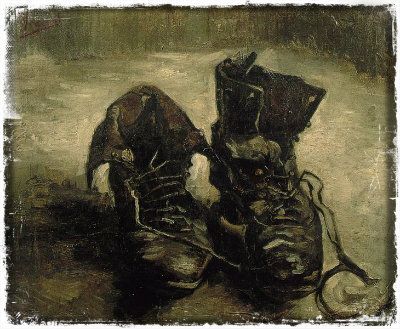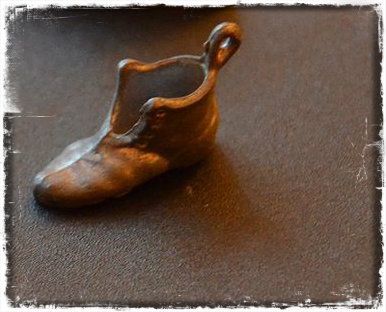
The Strange Fate of George Morris’ Brother’s Dirty Old Shoe
by T.C. Powell
It’s hard enough for George Morris to pretend he’s not poor without having his brother’s beat-up shoes next to the door. They’re brown where they’re not smeared with the black of the street and they’re idle when they should be out looking for work. Hoover was right about these people and Roosevelt’s a fool, and Ralph is in bed, of course. Said last night that he felt ill, making his excuses early.
Enough’s enough; Mr. Darrow is coming over to discuss business.
“Ralph,” George calls. He knocks on the hollow wood door.
“Go ‘way. Told you last night I don’t feel right.”
“That’s why I’m knocking, Ralph. Why don’t you get some fresh air? It’ll do you good.”
“Go to hell,” Ralph says. “I need to sleep.”
You need a job, George thinks. You need to get your hobo shoes off of my floor before Mr. Darrow comes by and thinks I’m a bum and takes his business someplace else.
“Listen,” George says, “I’m going to be having company soon. Lady company. Can you hear me, Ralph? I’d like to have the place to myself for a little while. Don’t you think that’s fair, since I’m the one paying for it?”
A minute passes and there’s no answer. George knocks again. Then: movement behind the flimsy door, the creak of antebellum floorboards, like a strangled mare.
George steps away.
Ralph emerges in underclothes as tattered as the shoes. They haven’t been washed in the seven weeks he’s lived there, and they smell like ammonia. His chin is covered in three days’ growth, and sweat-soaked dirt has collected on his face where the skin crinkles.
Ralph is a bum, an honest-to-god bum, no different than the ones who live in the roundhouse.
Except for George’s charity, of course.
“You goddamned liar,” Ralph says, looking down at George. “There ain’t no lady coming over. You just want to be rid of me, your own family. You’re exactly like Dad was ‘fore the Devil struck him down.”
George looks up at Ralph and wants to hit him. Knock him flat for disrespecting their father. But Ralph is a big cuss and he knows how to box, and Mr. Darrow will be there any minute. And the shoes are still laying there, dirtying up the place.
“I think you should leave,” George says.
“I’m going back to bed. I told you I was sick. Soon as I’m well, I’ll find a job--you’ll see. Then I’ll be out of your life and you won’t see me no more, just the way you want it.”
“This is my place, Ralph, and I’m telling you to get. Leave now. Leave now, or else.”
Ralph draws himself up and puts his chest out, like from his boxing days. “You threatening me? You ain’t man enough, kid brother. You never will be, neither.”
George takes out a knife from his back pocket. He’s been carrying it for months now, for the walks down the block to the market. The people are so poor, so desperate, he doesn’t trust them. He’s never had to use it, or even pull it out, till now.
“A knife?” Ralph asks. “I’m your blood--your brother. We used to play together.”
That’s true. George remembers going with Ralph down to the Samabac River, catching fireflies in Mom’s jars. A long time ago. But now Ralph’s backing up, inching to the front door and keeping clear of the knife. Finally got the message.
“I remember,” George says. “I remember how you slugged Dad the night you walked out, and how Mom cried. How you never came by when he was dying or for his funeral. I should stab you dead right now.”
“I got no place left to go to, Georgie.”
George pulls the knife back, ready to make good on his threat.
Ralph blindly grabs at the doorknob behind his back, and yanks the door open. “I’m going, Georgie, I’m going!” He turns and runs down the narrow hallway, towards the stairwell.
George bends over and picks up one of the battered shoes. “Take your garbage with you.”
He throws the shoe, hard. It hits Ralph on the small of the back, then clumps to the floor. It stops on its side with its tongue out.
Ralph doesn’t stop for it. Instead he hits the stairs and keeps on running, barefoot. It’s winter out, and he’ll be cold. Maybe worse. Probably worse.
It’s what he deserves.
George moves to close the door when he realizes that there’s still one bad shoe in his apartment.
He picks it up and means to throw it, to put it next to the other, so that whatever jerk comes by can have a set.
But then there’s a figure in the stairwell, a gentleman in a black long coat and top hat. Mr. Darrow.
George freezes, shoe in hand. He doesn’t know whether to close the door, or throw the shoe into the hall, so he just stands and waits.
Mr. Darrow arrives in front of George’s door carrying a small wooden case--the board game prototype Mr. Darrow had created from George’s ideas--and looks down at the disgusting shoe in George’s hand.
Mr. Darrow smiles. “Why, that’s the exact sort of thing I’m looking for, George; it captures the spirit of our time, the hopelessness of penury. It sums up our game quite perfectly! Let me come in--I have some ideas I’d like to discuss--but before that, allow me to ask: Can I have that shoe? I have a meeting with the Parkers tomorrow morning, and I’d like them to see it. I think it will help them to understand.”
George doesn’t know what to say. He steps aside, allowing Mr. Darrow to enter the apartment.
“You don’t mind, do you?” Mr. Darrow asks, taking the filthy shoe from George’s hands.
There is no one in the hallway. George doesn’t mind at all, and he throws the front door shut.

* * *
Previously appeared in Every Day Fiction, February 2011
* * *
T. C. Powell starves full-time and is a freelance writer on the side. He has been published by Flash Fiction Online, New Myths, Big Pulp, Every Day Fiction, and others. Additionally, he has twice been selected as a Writers of the Future Semi-Finalist. His woeful web presence can be found at http://tcpowellfiction.blogspot.com.
What do you think is the most important part of a historical fiction story?
The story part.
My bachelor's degree is in history -- I appreciate, as much as anyone, accuracy in historical detail. But histories are themselves available for those who wish them. A historical fiction should have all of the components of any other good fiction, and where fidelity to the facts is in conflict with telling the best possible story, it is the story that should win out. Let people be enthralled and driven to examine the record for themselves, if need be, to suss out where fiction departs from the mundane.









0 comments:
Post a Comment